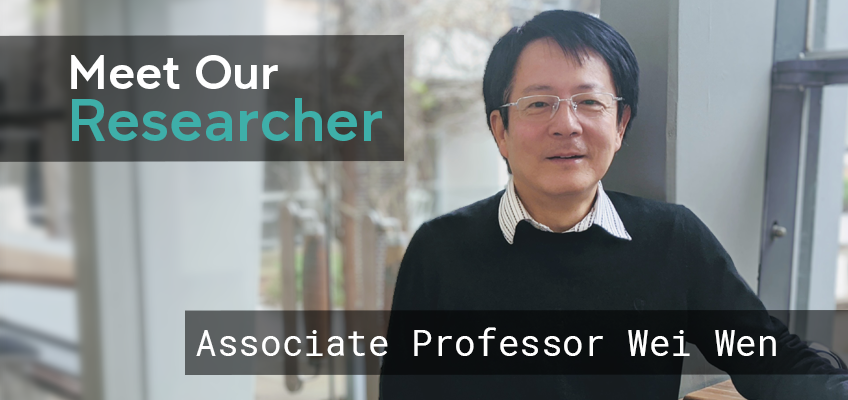20 Jul 2020

The field of healthy brain ageing is broad and across researchers there is the common goal of ground-breaking outcomes to change the landscape of cognitive decline research and practice. Leader of CHeBA’s Neuroimaging Group, Associate Professor Wei Wen, highlights the importance of incremental research contributions, which play a fundamental role in shaping the foundation for more radical findings.
How did you first get into researching the ageing brain?
I was a PhD student doing engineering at the University of Sydney. My degree directly involved research which was ultimately how I entered the field. Now, there is no going back as I am extremely passionate about my specialty area of research which is Neuroimaging. Imaging is a fantastic tool which we can use to ask many meaningful research questions and explore both the structure and function of the human brain.
Did you experience a ‘defining moment’ which led you to this field?
Prior to working at CHeBA I completed a research project for UNSW’s School of Mechanical Engineering. When this came to an end I was searching for a new role, a position became available at CHeBA. I had not previously worked in brain related research but applied regardless.
Once I commenced working within neuroscience I was hooked. It has consequently inspired me to continue pursuing research in this area.
Do you have any personal interests or activities which are protective behaviours against cognitive decline?
I am health conscious plus I have the benefit of undertaking brain research, which means that I am aware that diet, exercise, and some degree of intellectual challenge are good for the brain. I exercise daily and wear a step tracking watch which helps me stick to my daily goal of a minimum of 10,000 steps, as well as records how long I have exercised for each day which is really useful.
What are you currently researching?
I am involved in several projects relating to the work of PhD students that fall under my supervision. There are many different aspects of ageing and we want to facilitate healthy ageing instead of pathological ageing. To do this, we consider varying factors affecting healthy ageing - including both environmental and genetic factors. Currently, we have several projects centred around this theme with one of them looking at how the brain contributes to longevity. We are researching the genetics of longevity, the structure of the brain, and brain functionality. Another project is looking at MRI brain scans to determine the brain’s health status. We are extracting features of these brain scans to determine whether there is any pathology in the brain. Additionally, we are creating new image metrics to capture the essence of brain health, ageing and pathology.
Why is your research important?
Our research contribution is incremental with many epiphany moments and we hope that these moments of revelation will result in ground-breaking findings in this area. This is our ultimate hope and drives me to keep working at it. What my group is doing is very important to the bigger picture.
We are shedding light on the nature of the brain’s structure and function which is essential for understanding cognitive health. Adding to our knowledge base is critical for facilitating ground-breaking research findings. This aspect of research is very important to me personally.
What do you love about working for CHeBA?
CHeBA is a very interesting institution due to its diversity. We have biomedical engineers, such as myself, doing neuroimaging research, and we may look at things from a different point of view to a clinician, for example. However, we also have access to clinicians such as neuropsychiatrists, neuropsychologists and other healthcare practitioners to discuss our findings. There are geneticists to bump into in the corridor and I have the wonderful opportunity to discuss with them my curiosities and questions on the influences that genetics and environment have on brain ageing. If I want to talk about algorithms, we have mathematicians and statisticians to talk to as well.
This makes for a very rich, cognitively diverse environment where one learns new things every day.
I am definitely missing being in the office at the moment and interacting, asking questions and catching up with colleagues. CHeBA offers a very stimulating work environment which I really enjoy.
What is the ultimate hope you have for your research?
We are always hoping for that big ground-breaking research finding; however, we are making more incremental contributions. Currently, another broad area we are working within is to measure cerebral vascular burden using brain images; mainly brain MRI scans. This would be an achievement in terms of providing incremental contributions to the brain ageing field. From here, we could commence developing new tools, methodologies, and new imaging modalities in this area.
This interview was undertaken during the COVID-19 self-isolation period. Associate Professor Wen found that having video calls over dinner with his family and friends supported his mental resilience and kept him feeling socially connected while physically isolated.
Donations are fundamental for critical research to continue following COVID-19.
If you would like to discuss supporting A/Prof Wen’s work specifically, or would like information on leaving a legacy via a Gift in your Will, please contact h.douglass@unsw.edu.au.

Associate Professor Wei Wen is the Leader of CHeBA’s Neuroimaging Group. Professor Wen studied a Bachelor of Engineering at Jiangsu University, China, followed by a PhD in Engineering at the University of Sydney. His broader research interests include medical imaging, computational neuroanatomy, brain anatomy, MRI analysis, and Mathematical Modelling. Associate Professor Wen believes that one of CHeBA’s strengths is its diverse multi-disciplinary team which facilitates continual learning and development across researchers.
